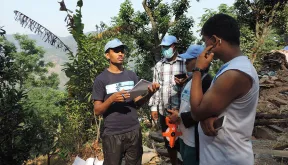National UN Volunteers receive a volunteer living allowance to sustain a basic, adequate and safe lifestyle. This allowance varies from one location to another depending on local living costs, but all national UN Volunteers in the same location receive the same allowance. Below is a summary of the Conditions of Service.
Duration of assignments
The duration of national UN Volunteer assignments may vary. The minimum service period is two weeks and the maximum, whether under one assignment or accumulated over several assignments, is four years. Extensions beyond the four-year limit are not considered, since a national UN Volunteer assignment is not a career. However, one can serve as a national UN Volunteer again after a minimum of ten years have passed to allow young volunteers who would like to serve again later in life as mid-level or higher professionals to do so. Furthermore, there is no durational time limit imposed for those who have reached retirement age.
Allowances
The purpose of allowances for national UN Volunteers is to enable the national UN Volunteers to sustain a modest and secure standard of living at the duty station. The allowances are in no way to be understood as a compensation, reward or salary in exchange for the volunteer work.
Pre-Assignment Grant: is a set amount that is a contribution towards all expenses incurred before the Commencement of Service date. This is a one-time payment made only to the national UN Volunteer to assist with pre-assignment expenses, including but not limited to all costs related to obtaining and delivering necessary paperwork and photos as requested by the entry medical examination, any required vaccination(s), and the purchase of first-aid and relevant prophylactic health items.
Settling-in, moving and travel entitlements: If the duty station of the assignment is not within commuting distance, national UN Volunteers are entitled to receive a settling-in-grant and reimbursement of the costs of travel and moving personal effects to and from the duty station.
For contracts of less than 12 months, the settling-in-grant is pro-rated according to contract duration. Reimbursements are based on submission of supporting invoices or other valid documentation. Travel reimbursement covers in-country travel by the most direct and economic mode of safe travel to the duty station. The date of travel must be as close as possible to the day the national UN Volunteer reports to the duty station.
Volunteer Living Allowance (VLA): All national UN Volunteers are entitled to a monthly volunteer living allowance. The purpose of this allowance is to cover the basic living costs of the national UN Volunteer, and her or his family when applicable. The allowance is to ensure that the volunteer can sustain a basic, adequate and safe lifestyle. The monthly allowance rate is a fixed rate for the duty station as established by UNV headquarters.
Resettlement allowance: Eligible national UN Volunteers are entitled to receive a resettlement allowance upon satisfactory completion of the assignment. The allowance assists the volunteer to reintegrate into society both professionally and personally upon completion of their UN Volunteer service.
Well-Being Differential: National UN Volunteers serving in locations where living conditions are substantially lower than a threshold established by UNV Headquarters are provided a Well-Being Differential to offset the diminished standard of living of national UN Volunteers serving in UNV-determined hardship duty stations.
Leave entitlements
Annual leave: National UN Volunteers accrue an entitlement to annual leave at the rate of 2.5 working days per completed month of assignment. However, a national UN Volunteer can at no point during the UNV assignment accrue more than 30 days of annual leave.
Maternity leave: Female national UN Volunteers are entitled to 16 weeks of maternity leave per pregnancy during their service as national UN Volunteers. Maternity leave should normally be taken between six weeks to two weeks prior to the calculated date of birth.
Paternity leave: A national UN Volunteer with a contract of at least 3 months shall receive 10 working days of Paternity Leave for the birth of their recognized newborn child.
Learning and Training Leave: National UN Volunteers are entitled to a maximum of 10 working days of Learning and Training Leave per consecutive 12 months of the UN Volunteer assignment when meeting criteria set forth in the UNV learning policy.
Special leave: At the request of a national UN Volunteer, the UNV headquarters may grant special leave in highly exceptional cases of emergency or for humanitarian reasons, for a period of time as UNV may prescribe.
Medical and life insurance
Medical insurance: National UN Volunteers and their family are covered by a medical insurance scheme for the duration of the assignment to cover medical treatment costs incurred during the assignment. This includes permanent disability insurance.
Post Service Medical Coverage: Health insurance of national UN Volunteers and their family extends one month after the last day of the national UN Volunteer Contract date to assist with reintegration into national healthcare schemes after their service is completed.
Life Insurance: National UN Volunteers are covered by life insurance for the duration of the assignment. In the event that a national UN Volunteer dies during the UNV assignment, the designated beneficiaries will be entitled to receive the life insurance lump sum.
You can view the current description of insurance benefits for national UN Volunteers here.
IMPORTANT: UNV, as part of the United Nations System, has a no-tolerance policy towards Sexual Exploitation and Abuse (SEA). For this reason, we adhere to all policies, procedures and training of the United Nations on The Prevention of Sexual Exploitation and Abuse (PSEA). UNV also has a mandatory e-learning course for all volunteers to be taken pre-deployment, whether at Headquarters or at other duty stations, on our e-learning platform. This e-learning course is composed of a set of lessons designed to raise awareness about SEA, become familiar with a range of measures to combat SEA, understand the impact on victims and the consequences for UN Personnel who commit Sexual Exploitation and Abuse.

